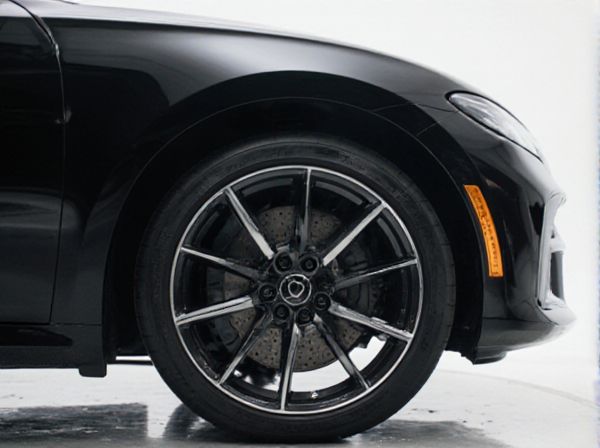
Photo illustration: Monoblock vs Modular Wheel
Monoblock wheels offer a single-piece construction that provides superior strength and a sleek, streamlined appearance, making them ideal for performance and durability. Modular wheels consist of separate components--rim and center--that can be customized and repaired individually, offering flexibility and style options. Your choice depends on whether you prioritize maintenance ease and customization or robust design and cohesive aesthetics.
Table of Comparison
| Feature | Monoblock Wheel | Modular Wheel |
|---|---|---|
| Construction | Single-piece forged or cast | Multiple parts bolted or welded |
| Weight | Lighter due to one-piece design | Heavier due to multiple components |
| Strength | High rigidity and durability | Adjustable strength depending on parts |
| Customization | Limited design flexibility | Highly customizable in size and style |
| Repairability | Difficult or costly to repair | Individual parts replaceable |
| Cost | Generally more affordable | Higher cost due to complexity |
| Applications | Standard vehicles, racing | Luxury, custom builds, off-road |
Introduction to Monoblock and Modular Wheels
Monoblock wheels are crafted from a single piece of material, typically aluminum alloy, offering enhanced strength and a sleek, uniform design. Modular wheels consist of multiple separate components, such as the rim and center, bolted together to allow customization and repair flexibility. The choice between monoblock and modular wheels depends on performance needs, aesthetic preferences, and maintenance considerations.
Defining Monoblock Wheels
Monoblock wheels are crafted from a single solid piece of aluminum alloy, offering enhanced structural integrity and reduced weight compared to modular wheels, which consist of multiple components bolted together. This one-piece construction improves strength and durability while simplifying maintenance and repairs. Monoblock wheels are preferred in high-performance and racing applications due to their superior rigidity and precision engineering.
Understanding Modular Wheel Construction
Modular wheel construction involves assembling three distinct parts: the rim, the center, and the barrel, allowing for customization in size, width, and finish. Each component is individually manufactured and bolted together, offering enhanced repairability and flexibility compared to monoblock wheels, which are cast or forged as a single piece. This design facilitates tailored weight distribution and performance tuning, making modular wheels a preferred choice in high-performance and luxury automotive applications.
Key Differences Between Monoblock and Modular Wheels
Monoblock wheels are crafted from a single piece of metal, offering enhanced strength and a lighter weight compared to modular wheels, which consist of multiple components bolted together. The modular design provides greater customization options such as adjustable offsets and various finishes, whereas monoblock wheels prioritize simplicity and durability. Maintenance and repair of modular wheels can be more complex and costly due to their multi-piece construction, while monoblock wheels are easier to clean and maintain because of their solid structure.
Performance Comparison: Strength and Durability
Monoblock wheels exhibit superior strength due to their single-piece forged or cast construction, offering enhanced impact resistance and rigidity ideal for high-performance applications. Modular wheels, with their multi-piece design, provide customizable strength through bolted sections but may present potential weaknesses at connection points under extreme stress. Durability favors monoblock wheels in demanding environments, while modular variants excel in repairability and adaptability without compromising core structural integrity.
Weight and Efficiency: Which Wheel Wins?
Monoblock wheels typically weigh less due to their single-piece construction, enhancing overall vehicle performance and fuel efficiency by reducing unsprung mass. Modular wheels, composed of multiple components bolted together, generally weigh more but offer greater customization and repairability. For weight-sensitive applications prioritizing efficiency, monoblock wheels often provide a superior balance of lightness and strength.
Customization Options and Aesthetics
Monoblock wheels offer a sleek, seamless design with limited customization, often crafted from a single piece of forged aluminum for enhanced strength and clean aesthetics. Modular wheels provide extensive customization options through interchangeable components like rims, centers, and bolts, allowing personalized fits, finishes, and styles tailored to individual preferences. The modular design enables a broader range of aesthetic choices, including multi-piece color schemes and intricate detailing, appealing to enthusiasts seeking unique, high-end looks.
Cost and Value Considerations
Monoblock wheels typically offer lower upfront costs due to their single-piece construction, making them an economical choice for budget-conscious buyers. Modular wheels, while more expensive initially, provide greater customization and repairability, enhancing long-term value by allowing individual component replacement. Evaluating the total cost of ownership--including purchase price, maintenance, and potential upgrades--helps determine the most cost-effective option between monoblock and modular wheels.
Ideal Applications: Track, Street, and Off-road
Monoblock wheels, constructed from a single piece of alloy, offer superior strength and stiffness, making them ideal for track racing where performance and weight reduction are critical. Modular wheels, composed of multiple components bolted together, provide customization options and repairability, favored for street use and off-road conditions requiring adaptability and durability. Off-road enthusiasts benefit from modular wheels' ability to replace damaged sections easily, while track and street applications demand the precision engineering and rigidity found in monoblock designs.
Choosing the Right Wheel for Your Vehicle
Selecting between monoblock and modular wheels depends on your vehicle's performance needs and aesthetic preferences. Monoblock wheels offer increased strength and lighter weight due to their single-piece construction, making them ideal for high-performance or sports vehicles. Modular wheels provide customization options with separate components, allowing easier repairs and tailored designs for trucks or luxury cars requiring versatility and style.
 caratoz.com
caratoz.com